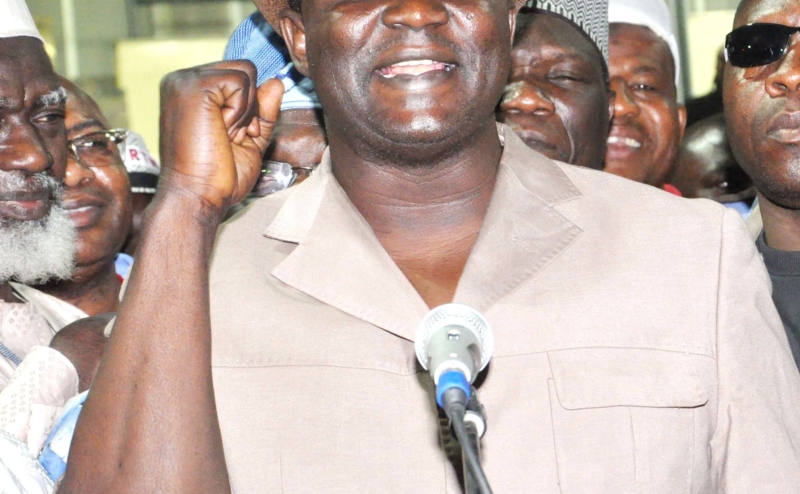Protesting Nigerian workers on Thursday put the Executive and the Legislative arms of government on the scale and concluded that their performances are far from satisfactory.
The protesters, led by the leadership of the Nigeria Labour Congress (NLC), the Trade Union Congress (TUC) and some Civil Society Organisations (CSOs) lamented that while the citizens groan under hardship, public officials were indifferent to their plight.
At the Abuja rally, the NLC President, Comrade Ayuba Wabba, who spoke on several burning national issues, particularly took up the National Assembly, which he described as a “criminal enterprise.”
He threatened that the organised labour in the country will picket the National Assembly and other institutions that are failing in their responsibilities to Nigerians.
Wabba said that President Muhammadu Buhari needs to give his anti-corruption crusade a better face, by making “accountability, transparency and rule of law his watchwords”.
Speaking at the Unity Fountain, Abuja, before marching to the Presidential Villa to meet the Acting President, Yemi Osinbajo, Wabba said that the protest was necessitated because “bad governance instead of good governance is thriving in Nigeria.
“The government must know that is it not only workers that are suffering, but ordinary citizens who depend on the workers, are suffering immensely. For this reason, we shall picket the institutions that make up government one after the other. After the Presidency, we are facing the National Assembly.
“So long as they are not living up to their responsibilities, we will make it very difficult for them to continue in the criminal enterprise they call the National Assembly. So, we demand accountability, we demand due process,” Wabba stressed.
He further explained that, “Nigerians are going through serious challenges more than before”, adding that “these challenges are compounded by the total absence of good governance, accountability, transparency and rule of law.
“Any system that does not have the ingredients of good governance will mean suffering and more hardship for the citizens. So, that is why we are marching to canvass for good governance”.
Buttressing his points he stated: “Imo State governor is owing pensioners several months’ arrears and he is a member of the ruling All Progressives Congress (APC); is that a sign of good governance?”
Wabba continued: “Things have not really changed and we have to be careful. The fight against corruption is the fundamental basis that every government must embark on for Nigeria to develop.
“Imo State Governor has shamelessly deceived the people of Imo State by telling them that Dana Air is now Imo Airline. Looking at it, of what benefit is this that Governor Rochas Okorocha has done? It is also the same aircraft that Dana has been using that now turned into Imo Airline,” he lamented.
The National Secretary of Textile Workers Union, Dr. Isa Aremu, said: “You remember last year when all of a sudden, the government we voted in, that said it stands for change, increased the price of fuel?
“The NLC kicked against it and some people said it was not a problem but today, everything that the NLC protested against is happening. Now, people are complaining of high cost of living, and we are happy that Nigerians are coming out to demand for accountability and good governance from their government.
“We are protesting for good governance which is accountability, prompt payment of salaries, result-oriented policies that will pull the economy out of recession, interrupted power supply and adequate minimum wage. Non-payment of salaries is policy corruption. More than ever before, this is the most important time to increase the wages of workers,” he said.
Osinbajo, who received the delegation led by Wabba and TUC leader, Bobboi Kaigama, was presented an 18-point demand.
In his response, Osinbajo declared that corruption has so permeated the Nigerian society such that even religious institutions are not exempted; and that it has been at the root of the problem dragging the nation backwards.
“Yet, wealthy and influential persons are fighting hard to make the trend continue despite the Buhari administration’s best intentions and efforts,” Osinbajo lamented.
He recalled how corruption almost grounded the country, declaring that not much can be achieved to move the country forward without seriously confronting sleaze and graft, something the Buhari administration is determined to do.
Osinbajo said: “Every time you fight corruption the way we are trying to fight corruption, there is a major fight back, because corruption in this country is wealthy, powerful, influential, and it is in every aspect of our lives.
“It is in practically all institutions, including religious institutions. The social media campaign of ‘bring back corruption’ is an orchestrated one. Nobody that is suffering can say bring back corruption.
“Attempts by those who are being tried for corruption to delay trials are also parts of the orchestrated campaign. If we don’t speak up against corrupt officials who make it look as if there is a witch-hunt then we will not succeed in the fight”.
He also reiterated the administration’s commitment to workers’ welfare, even as he recalled how President Buhari sourced bailout funds to help state governments offset the backlog of workers’ salaries and pensions.
He further pledged that government would carry the labour and civil society along in the plans to revive the economy.
Wabba, who spoke on behalf of the 18 union leaders, said that corruption had become systemic in Nigeria, urging the government to address the issue of accountability and adherence to the rule of law, whilst also pointing out that the challenge in Nigeria was not about resources but about prudent management.
Kaigama added that every Nigerian should join hands with the federal government in fighting corruption, which must not be viewed only in terms of Naira and Kobo, but also in ensuring equity among the populace.
Source: News now
This page has been viewed 355 times


























